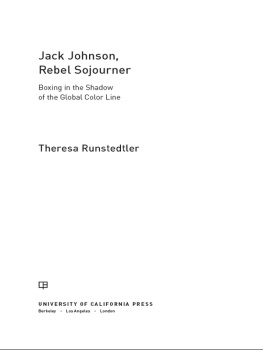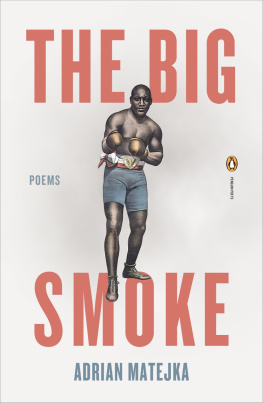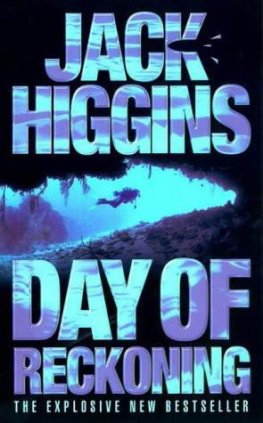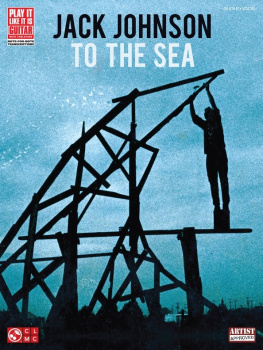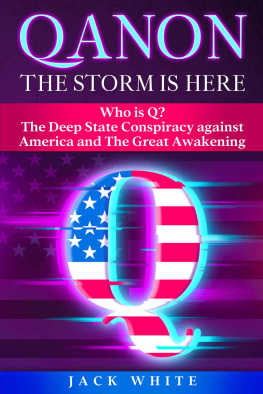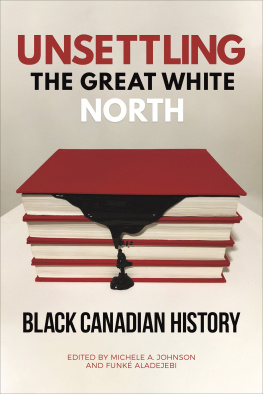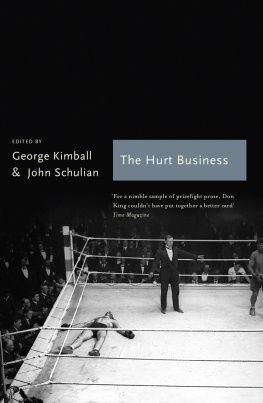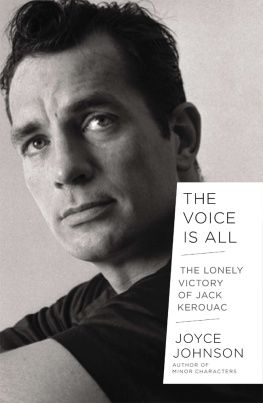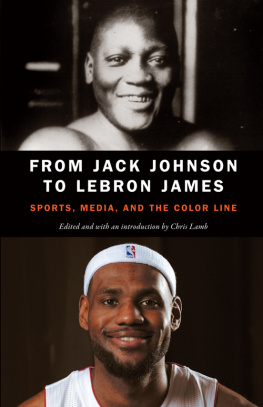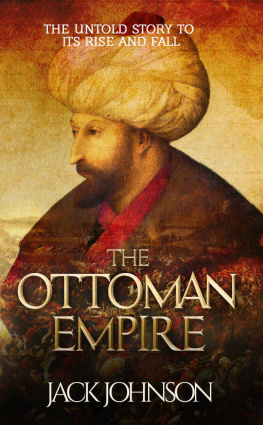Johnson Jack - The Great White Hopes : the Quest to Defeat Jack Johnson
Here you can read online Johnson Jack - The Great White Hopes : the Quest to Defeat Jack Johnson full text of the book (entire story) in english for free. Download pdf and epub, get meaning, cover and reviews about this ebook. City: New York, United States, year: 2013,2005, publisher: The History Press, genre: Non-fiction. Description of the work, (preface) as well as reviews are available. Best literature library LitArk.com created for fans of good reading and offers a wide selection of genres:
Romance novel
Science fiction
Adventure
Detective
Science
History
Home and family
Prose
Art
Politics
Computer
Non-fiction
Religion
Business
Children
Humor
Choose a favorite category and find really read worthwhile books. Enjoy immersion in the world of imagination, feel the emotions of the characters or learn something new for yourself, make an fascinating discovery.
- Book:The Great White Hopes : the Quest to Defeat Jack Johnson
- Author:
- Publisher:The History Press
- Genre:
- Year:2013,2005
- City:New York, United States
- Rating:5 / 5
- Favourites:Add to favourites
- Your mark:
- 100
- 1
- 2
- 3
- 4
- 5
The Great White Hopes : the Quest to Defeat Jack Johnson: summary, description and annotation
We offer to read an annotation, description, summary or preface (depends on what the author of the book "The Great White Hopes : the Quest to Defeat Jack Johnson" wrote himself). If you haven't found the necessary information about the book — write in the comments, we will try to find it.
Abstract: Great white hopes Read more...
The Great White Hopes : the Quest to Defeat Jack Johnson — read online for free the complete book (whole text) full work
Below is the text of the book, divided by pages. System saving the place of the last page read, allows you to conveniently read the book "The Great White Hopes : the Quest to Defeat Jack Johnson" online for free, without having to search again every time where you left off. Put a bookmark, and you can go to the page where you finished reading at any time.
Font size:
Interval:
Bookmark:
THE
GREAT
WHITE
HOPES
THE
GREAT
WHITE
HOPES
THE QUEST TO DEFEAT JACK JOHNSON
GRAEME KENT
FOREWORD BY HARRY CARPENTER

First published in 2005
The History Press
The Mill, Brimscombe Port
Stroud, Gloucestershire, GL5 2QG
www.thehistorypress.co.uk
This ebook edition first published in 2013
All rights reserved
Graeme Kent, 2005, 2013
The right of Graeme Kent to be identified as the Author of this work has been asserted in accordance with the Copyrights, Designs and Patents Act 1988.
This ebook is copyright material and must not be copied, reproduced, transferred, distributed, leased, licensed or publicly performed or used in any way except as specifically permitted in writing by the publishers, as allowed under the terms and conditions under which it was purchased or as strictly permitted by applicable copyright law. Any unauthorised distribution or use of this text may be a direct infringement of the authors and publishers rights, and those responsible may be liable in law accordingly.
EPUB ISBN 978 0 7524 9615 3
Original typesetting by The History Press
CONTENTS
FOREWORD
by Harry Carpenter
T his book is about envy: white envy of black talent. The talent belongs to Jack Johnson, the first black man to win the world heavyweight championship. Because he was black, and successful, he was reviled in the USA by white men. Mind you, he didnt help his cause. He was saucy, he smiled a lot (this was interpreted as a sneer), he flaunted his wealth with fast cars and sprauncy clothes, and, oh, the horror of it, he married two white women and formed a liaison with a third, which led to a criminal charge and exile from the States. In the seven years of his reign as champion, the world of boxing was determined to get him beaten.
Before we get too high-minded about what seems to us now an insane chase for a white Sir Galahad, lets remember that other sports dragged their feet when it came to recognising black talent. Jackie Robinson was the first black player allowed to participate in major league US baseball, and that didnt come about until the late 1940s, some thirty years after Jack Johnson had left the world stage.
In Britain black (or coloured, as we had to say then) boxers were denied the right to fight for a British title until 1948. The first man to break the colour bar was Dick Turpin, elder brother of Randolph. Hasnt there always been a white edginess about black success and doesnt it still exist? For evidence of that I give you some members of football crowds.
I never met Jack Johnson (he died in 1946), but in the 1950s I went to Texas, Johnsons home state, where segregation still existed. Black people couldnt stay in white hotels, couldnt eat in white restaurants and, when they got on a bus, were banished to the back seats. In those surroundings it wasnt too difficult to understand how the impact of Johnsons boxing supremacy must have felt.
The American white hatred of Jack Johnson in those early years of the twentieth century was mirrored when Muhammad Ali came on the scene in the 1960s. Here was a modern-day Johnson: voluble, smiling, taunting, boasting and blessed with a boxing talent such as had not been seen before, or since. The US press immediately pinned the bad-boy label on him. He had too much lip, he was arrogant, he answered back and his unpopularity with white people increased a thousand-fold when he refused to swear the oath of allegiance to the US flag, which meant he wouldnt go to Vietnam (them Viet Cong never called me nigger). The fate of Jack Johnson now befell Muhammad Ali. He faced a criminal charge and, although he wasnt forced to leave the States, he was exiled from boxing for more than three years. When he was allowed back, his first opponent, Jerry Quarry, was a white man.
Graeme Kent is a painstaking researcher and writer. You will find plenty in this book you didnt know before. I thought I knew a bit about Victor McLaglen. I was wrong. I didnt know the half of it. There are two levels at which Mr Kents book is important. It adds considerably to our knowledge of the heavyweight championship and it lays bare a fascinating slice of social history. Graeme Kent has pulled off a fine double.
Harry Carpenter
March 2005
ACKNOWLEDGEMENTS
I have received much help from many people in the writing of this book, and I would like to express my thanks to them. For information on Victor McLaglens service in the Life Guards at the turn of the century I am indebted to K.C. Hughes, Assistant Curator of the Household Cavalry Museum, while details of other aspects of McLaglens rather mysterious wartime military career were supplied by Major (retd) J.E.H. Ellis, Curator of the Cheshire Military Museum, Major (retd) J. Rogerson, Curator of the Prince of Wales Royal Regiment and Queens Military Museum, and Amanda Moreno, Curator of the Regimental Museum of the Royal Irish Fusiliers.
Patti Wotherspoon of the Vancouver Public Librarys Research and Information Centre provided background information on Jack Johnsons sojourn in Canada, while closer to home Helen Wallder of the Doncaster Local Studies Library discovered a great deal of material on local heavyweight Iron Hague. Tracey Booth of the Local Studies Library, Kingston upon Hull, found information about the early life of Con OKelly. Malcolm Matthews of the Local and Naval Studies Section of the Plymouth Library Service provided information about the White Hopes campaign in the West of England. My friend, the late Bob Hartley, was able to supply a great deal of first-hand information about life on the boxing booths and the career of the American heavyweight George Christian. I am indebted to Barry Hugman, Editor of The British Boxing Board of Control Yearbook, for his permission to reprint some of the material on Victor McLaglen that was first published in his annual. I am grateful to Dr Sandra Salin for her meticulous translations of French sporting journals and magazines from the opening decades of the twentieth century.
I am deeply indebted to Harry Shaffer for allowing me access to many old newspaper clippings from his magnificent collection in Archives of Antiquities of the Prize Ring antekprizering.com.
The only other book published on the subject of the White Hopes is White Hope by Oswald Frederick (the late Fred Snelling, doyen of British boxing writers). This is a small paperback published in the 1940s. Fred, with typical modesty, claimed that he wrote it in a few weeks while fire-watching during the London bombing raids. Fred was very kind to me when as a young man I first wrote about boxing in the 1950s, and I hope that I may have done some justice to the topic that is rightfully his.
Finally, I would like to express my gratitude to my editor Sarah Bryce, for her unflagging enthusiasm and support for the project and her dedication and conscientiousness in seeing it through to its conclusion.
Graeme Kent
Lincolnshire, March 2005
INTRODUCTION
T he worldwide search between 1908 and 1915 to find a white fighter who could defeat the unpopular black champion Jack Johnson is one of the most unusual yet little-known stories in the annals of world sport. This is the first full-length book to deal with the history of the White Hopes.
Carrying out the research has occupied many years in a number of different countries. A great deal has been written about the charismatic and controversial Johnson, but hardly anything has been said about his Caucasian challengers. Apart from the film actor Victor McLaglen, none of the White Hopes wrote a book about his experiences, and even McLaglens autobiography hardly touched upon his ring career. Much of this investigation necessarily has been conducted with the aid of yellowing press cuttings and dusty contemporary accounts of court proceedings between 1908 and 1915, along with other public records and private reminiscences, published and unpublished.
Next pageFont size:
Interval:
Bookmark:
Similar books «The Great White Hopes : the Quest to Defeat Jack Johnson»
Look at similar books to The Great White Hopes : the Quest to Defeat Jack Johnson. We have selected literature similar in name and meaning in the hope of providing readers with more options to find new, interesting, not yet read works.
Discussion, reviews of the book The Great White Hopes : the Quest to Defeat Jack Johnson and just readers' own opinions. Leave your comments, write what you think about the work, its meaning or the main characters. Specify what exactly you liked and what you didn't like, and why you think so.


